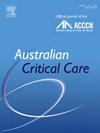icuRESOLVE-D (Intensive Care Unit REcovery Solutions cO-Led through surVivor Engagement-Digital): Protocol for a multicentre randomised controlled trial of digital peer support for adult survivors of critical illness
IF 2.7
3区 医学
Q2 CRITICAL CARE MEDICINE
引用次数: 0
Abstract
Background
Peer support is a candidate intervention to improve health-related quality of life in survivors of critical illness. This trial will evaluate the effect of a codesigned digital peer support intervention (expert-facilitated, web-based peer support) compared to usual care.
Design
This study is planned as a randomised, multicentre, two-arm, parallel-group (1:1) hybrid effectiveness implementation trial of a digital peer support model versus usual care. This trial will include an embedded process evaluation and health economic analysis.
Participants
A total of 212 adult intensive care unit (ICU) survivors, recruited by telephone from 28 days after hospital discharge.
Study setting
Six health services in Victoria and the Australian Capital Territory, Australia—including five metropolitan and one regional hospital.
Main outcome measures
The primary outcome is the self-reported health status at 90-days post hospital discharge using the EuroQol Visual Analogue Scale. Secondary outcomes will be measured at baseline 28 days after hospital discharge and at 90 days and 180 days after hospital discharge. Secondary outcomes include EuroQol five-dimensional five-level (EQ-5D-5L), Assessment of Quality of Life 6D, Impact of Events Scale-Revised, University of California Los Angeles three-item Loneliness Scale, Patient Health Questionnaire for Depression and Anxiety (PHQ-4), Connor–Davidson Resilience Scale, Patient Activation Measure, and healthcare costs.
Intervention
The codesigned digital peer support intervention is a rolling program consisting of four 1-h peer support sessions, occurring fortnightly, delivered via Zoom and facilitated by an expert clinical social worker or psychologist. The sessions include a formal (standardised education focused on ICU recovery) and an informal component (peer-to-peer discussion and peer support).
Discussion
This is a trial of a novel, codesigned, digital intervention aimed at improving recovery following critical illness. Through this randomised, parallel-group, two-arm, hybrid type 1 effectiveness implementation trial, we will examine the effectiveness and cost-effectiveness of a digital health peer support model and identify implementation factors necessary for scaling (if effective). Due to the digital health design, this trial has the potential to enhance equity of access to post-ICU services.
Trial registration
This study was registered to the Australian New Zealand Clinical Trials Registry (ACTRN12624000267550). This trial will be conducted in compliance with all stipulation of this protocol, the conditions of the ethics committee approval, the National Health and Medical Research Council, National Statement on ethical Conduct in Human Research (2007 and updates), and the Integrated Addendum to ICH E6(R1): Guideline for Good Clinical Practice ICH E6(R2) (2016). The protocol is reported according to the Standard Protocol Items: Recommendations for Interventional Trials (SPIRIT) checklist.
icuRESOLVE-D(重症监护病房康复解决方案,通过幸存者参与-数字):一项多中心随机对照试验方案,为危重疾病成年幸存者提供数字同伴支持
同伴支持是改善危重疾病幸存者健康相关生活质量的候选干预措施。该试验将评估共同设计的数字同伴支持干预(专家促进,基于网络的同伴支持)与常规护理相比的效果。本研究计划作为一项随机、多中心、双臂、平行组(1:1)的混合效果实施试验,将数字同伴支持模型与常规护理进行比较。该试验将包括嵌入式过程评估和卫生经济分析。参与者共212名重症监护病房(ICU)成人幸存者,从出院后28天通过电话招募。研究背景:澳大利亚维多利亚州和澳大利亚首都地区的六家卫生服务机构,包括五家大都市医院和一家地区医院。主要结局指标主要结局指标是使用EuroQol视觉模拟量表在出院后90天自我报告的健康状况。次要结局将在出院后28天基线、出院后90天和180天测量。次要结局包括EuroQol五维五级(EQ-5D-5L)、生活质量评估6D、事件影响量表-修订、加州大学洛杉矶分校三项孤独量表、患者抑郁和焦虑健康问卷(PHQ-4)、Connor-Davidson弹性量表、患者激活测量和医疗费用。共同设计的数字同伴支持干预是一个滚动项目,由四个1小时的同伴支持会议组成,每两周一次,通过Zoom提供,由临床社会工作者或心理学家专家协助。会议包括一个正式的(以ICU康复为重点的标准化教育)和一个非正式的部分(点对点讨论和同伴支持)。这是一项新的、共同设计的数字干预试验,旨在改善危重疾病后的康复。通过这项随机、平行组、双臂、混合1型有效性实施试验,我们将检查数字健康同伴支持模型的有效性和成本效益,并确定扩展所需的实施因素(如果有效)。由于数字健康设计,该试验有可能提高获得icu后服务的公平性。试验注册本研究已在澳大利亚新西兰临床试验注册中心注册(ACTRN12624000267550)。本试验将遵守本方案的所有规定、伦理委员会批准的条件、国家卫生和医学研究委员会、国家人体研究伦理行为声明(2007年及更新)和ICH E6(R1)综合附录:良好临床实践指南ICH E6(R2)(2016)。该方案根据标准方案项目:介入性试验建议(SPIRIT)清单进行报告。
本文章由计算机程序翻译,如有差异,请以英文原文为准。
求助全文
约1分钟内获得全文
求助全文
来源期刊

Australian Critical Care
NURSING-NURSING
CiteScore
4.90
自引率
9.10%
发文量
148
审稿时长
>12 weeks
期刊介绍:
Australian Critical Care is the official journal of the Australian College of Critical Care Nurses (ACCCN). It is a bi-monthly peer-reviewed journal, providing clinically relevant research, reviews and articles of interest to the critical care community. Australian Critical Care publishes peer-reviewed scholarly papers that report research findings, research-based reviews, discussion papers and commentaries which are of interest to an international readership of critical care practitioners, educators, administrators and researchers. Interprofessional articles are welcomed.
 求助内容:
求助内容: 应助结果提醒方式:
应助结果提醒方式:


